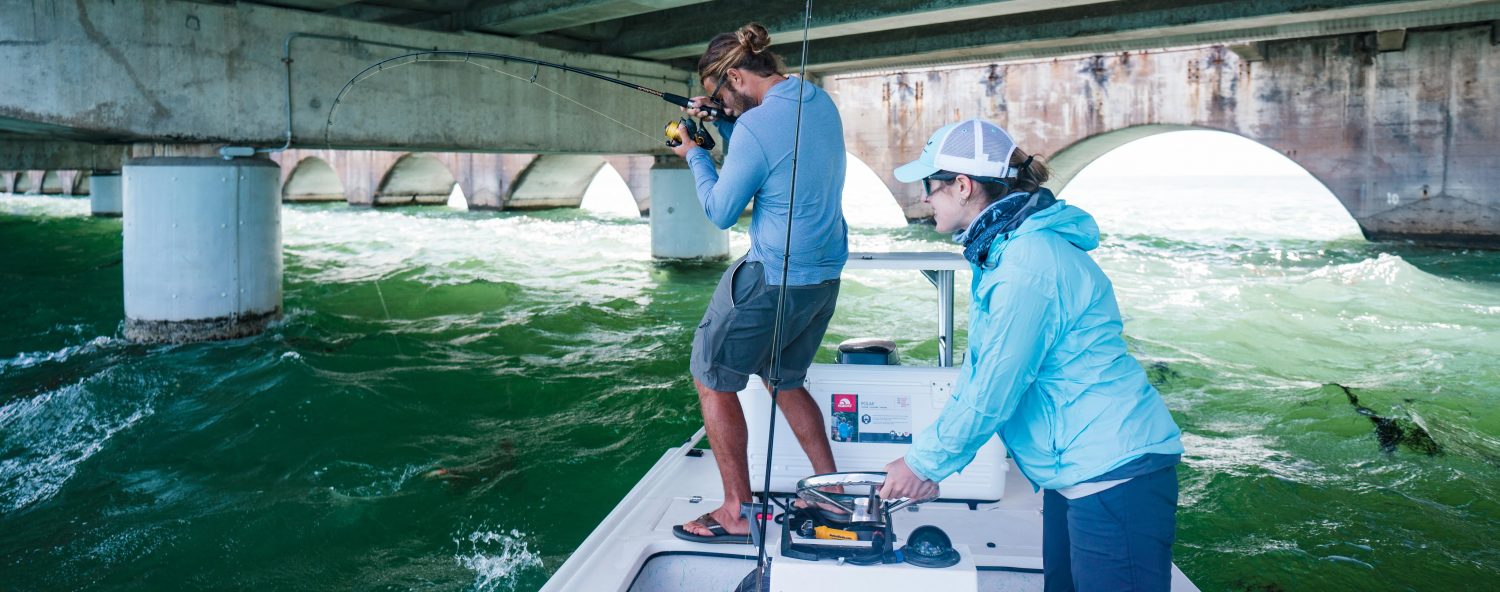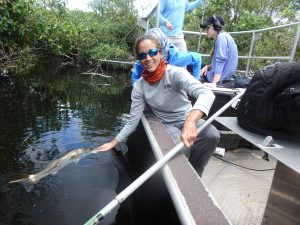 I am a coastal ecologist, with expertise on fish ecology, recreational fisheries, and disturbance ecology. My research program broadly focuses on how fish and fisheries respond to hydroclimatic variation and extreme disturbances and on the implications of these responses for their sustainability and to pressing water resources and climate challenges.
I am a coastal ecologist, with expertise on fish ecology, recreational fisheries, and disturbance ecology. My research program broadly focuses on how fish and fisheries respond to hydroclimatic variation and extreme disturbances and on the implications of these responses for their sustainability and to pressing water resources and climate challenges.
Our research approach to studying fish and fisheries is holistic and integrative. We consider recreational fisheries as inherently a coupled socioecological system, and thus blend in our research human and 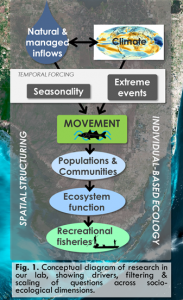 ecological dimensions in our studies. For instance, recent studies involve angler knowledge as a way to better understand data-limited species and have made strides to make these type of data quantitative and integrated into other types of data. We like to look at coastal fisheries problems through an individual lens, that focuses on the behavior of either fish or anglers and then we scale up inquiry from individual behavior to populations and communities, and ecosystem function and the provisioning of services. Our approach to tackling fish research focuses on both understanding process and pattern, and we thrive in conducting studies that blend these to inform management, conservation and restoration efforts. As others, we like for our research to be meaningful to society and help solve problems, and thus increasingly we find ourselves partnering with government, nongovernment and stakeholders (e.g., fishing guides associations) to coproduce research that addresses pressing societal needs and challenges and bring forth the relevance of fish and fisheries to these challenges. We are strong believers in team science and public engagement, and often collaborate with social and physical scientists, as well as with stakeholders to stretch the bounds and dimensionality of our questioning and make our findings accessible and actionable for stakeholders. We find that asking questions that cross multiple scales of ecological organization, integrate human and natural dimensions, and involve collaborative, transdisciplinary, and translational approaches resonate with who we are and maximizes our understanding in meaningful ways.
ecological dimensions in our studies. For instance, recent studies involve angler knowledge as a way to better understand data-limited species and have made strides to make these type of data quantitative and integrated into other types of data. We like to look at coastal fisheries problems through an individual lens, that focuses on the behavior of either fish or anglers and then we scale up inquiry from individual behavior to populations and communities, and ecosystem function and the provisioning of services. Our approach to tackling fish research focuses on both understanding process and pattern, and we thrive in conducting studies that blend these to inform management, conservation and restoration efforts. As others, we like for our research to be meaningful to society and help solve problems, and thus increasingly we find ourselves partnering with government, nongovernment and stakeholders (e.g., fishing guides associations) to coproduce research that addresses pressing societal needs and challenges and bring forth the relevance of fish and fisheries to these challenges. We are strong believers in team science and public engagement, and often collaborate with social and physical scientists, as well as with stakeholders to stretch the bounds and dimensionality of our questioning and make our findings accessible and actionable for stakeholders. We find that asking questions that cross multiple scales of ecological organization, integrate human and natural dimensions, and involve collaborative, transdisciplinary, and translational approaches resonate with who we are and maximizes our understanding in meaningful ways.
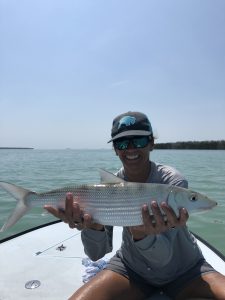 Over the past decade at FIU, we have been focusing on Everglades fisheries and in better understanding how fish track hydroclimatic variation across coastal seascapes to inform how fish and the fisheries they support will respond to the tension of climate change and ongoing restoration efforts. We consider ourselves extremely luck to work in the Everglades! Like other subtropical ecosystems, the ecology of the Everglades is governed by a pulsed disturbance regime, and the system has been subject to intense hydrological modification, allowing us to examine how fish communities respond to the interaction of natural and anthropogenic disturbances and the implications of this for the ability of coastal areas to provide key ecosystem services such as recreational fisheries. We aim for our research to contribute to our understanding of the ecology of these fisheries, and particularly of the freshwater flows-fisheries relationships that underpin fisheries production in our coasts, and importantly, of their sustainability in the face of both natural and anthropogenic disturbances. For instance, ongoing work takes a spatial approach that involves tracking of the movement and space use of valuable recreational fisheries across coastal seascapes that have suffered varying degrees of transformation due to human impacts (e.g., chronic decreases in freshwater inputs, hypersalinity and seagrass die-off), while informing federal and state water management practices, and partnering with fishing guides to derive hypotheses about fishery responses based on angler knowledge.
Over the past decade at FIU, we have been focusing on Everglades fisheries and in better understanding how fish track hydroclimatic variation across coastal seascapes to inform how fish and the fisheries they support will respond to the tension of climate change and ongoing restoration efforts. We consider ourselves extremely luck to work in the Everglades! Like other subtropical ecosystems, the ecology of the Everglades is governed by a pulsed disturbance regime, and the system has been subject to intense hydrological modification, allowing us to examine how fish communities respond to the interaction of natural and anthropogenic disturbances and the implications of this for the ability of coastal areas to provide key ecosystem services such as recreational fisheries. We aim for our research to contribute to our understanding of the ecology of these fisheries, and particularly of the freshwater flows-fisheries relationships that underpin fisheries production in our coasts, and importantly, of their sustainability in the face of both natural and anthropogenic disturbances. For instance, ongoing work takes a spatial approach that involves tracking of the movement and space use of valuable recreational fisheries across coastal seascapes that have suffered varying degrees of transformation due to human impacts (e.g., chronic decreases in freshwater inputs, hypersalinity and seagrass die-off), while informing federal and state water management practices, and partnering with fishing guides to derive hypotheses about fishery responses based on angler knowledge.
Teaching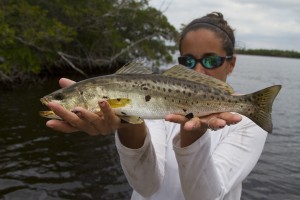
I currently teach the following courses:
ISC 5150, Introduction to Graduate Research (co-taught with M. Ross, FIU): An introductory course to graduate studies with a strong focus on developing writing skills.
EVR4026, Biotic Resources: An upper division Environmental studies majors course that examines people-resources using an ecosystem function-services-human well-being framework.
Mentoring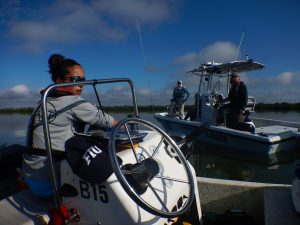
I currently advise 9 graduate students. Here are details on the students:
Carissa Gervasi, Ph.D. Earth Systems Science. Multiple data sources to assess the decline of Jack Crevalle in South Florida: implications for the management of an undervalued fishery.
Jordan Massie, Ph.D. Earth Systems Science. Response of Common Snook to hydrologic variation and extreme events in subtropical river: what driver their movement and distribution?
Cody Eggenberger, Ph.D. Environmental Studies. Movement and foraging ecology of two key recreational species, Common Snook and sub-adult Atlantic Tarpon, in two neighboring lake systems in Everglades National Park: what is the effect of coastal eutrophication?
Jonathan Rodemann, Ph.D. Earth Systems Science. How do fish cope with loss? Examining responses of recreational fisheries to seagrass die-off.
Nicholas Castillo, Ph.D. Earth Systems Science. Examining the threat of contaminants to bonefish in South Florida: what is role of pharmaceuticals?
Lulu Lacy, Ph.D. Earth Systems Science. Fish movement in the Amazon.
Mackenzie White, Ph.D. Earth Systems Science. Consumer movements of nutrients in the Shark River.
Natasha Viadero, MS. Earth Systems Science. Largemouth Bass movement in the Shark River in varying hydrological conditions.
Joshua Linenfelser, MS. Earth Systems Science. Identifying nutrient sourced to the coastal Everglades ecosystem.
